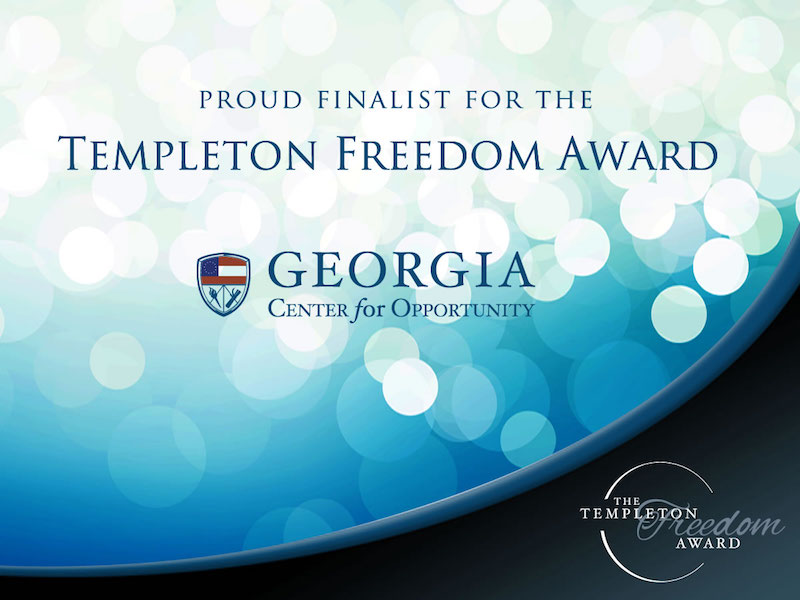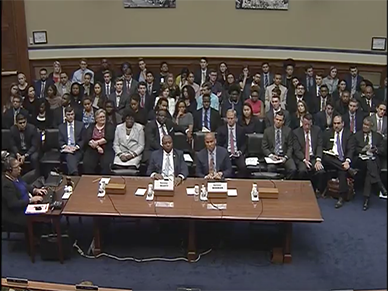
by Georgia Center for Opportunity | Sep 11, 2017
Amid growing acknowledgment for efforts to reduce prison recidivism rates in Georgia, the Georgia Center for Opportunity (GCO) has been named as a finalist for the highly competitive Atlas Network Templeton Freedom Award.
The honor recognizes GCO for recent efforts to assist formerly incarcerated individuals with successful reintegration into society. Through work with several community partners, the organization has orchestrated an effort that focuses on the rehabilitation and restoration of former offenders with their family and community. Aiming to help newly-released individuals gain employment and reconnect with their loved ones, GCO’s program has been credited with positively impacting the state’s justice system.
“We’re humbled to be considered as a global leader in promoting freedom and human flourishing, and congratulate the other finalists for their tremendous successes,” said Randy Hicks, President and CEO of GCO.
“Several hard-won policy changes and the work of many partners have contributed to a reduction of inmates in the state’s prison system,” Hicks added. “We predict the reforms spearheaded by GCO will continue to allow more individuals to successfully reenter society and become less likely to recidivate.”
The Atlas Network’s CEO, Brad Lips, praised GCO’s innovative approach to criminal justice reform.
“GCO’s Prisoner Reentry Initiative demonstrates that compassion for the incarcerated and their families can be aligned with the interests of taxpayers and public safety,” Lips said. “It’s a wonderful initiative that deserves to be emulated.”
GCO is included among seven globally-selected finalists who have made strides in public policy that encourage prosperity, innovation, and human fulfillment via free competition. Other finalists include the Beacon Center of Tennessee, based in Nashville, Tenn., the IMANI Center for Policy and Education, based in Accra, Ghana, Instituto de Estudos Empresariais (IEE), based in Porto Alegre, Brazil, Instituto Mexicano para la Competitividad (IMCO), based in Mexico City, Mexico, and the Macdonald-Laurier Institute for Public Policy (MLI), based in Ottawa, Canada.
All finalists will receive $25,000, while the winning organization will receive $100,000.
The winner of the Atlas Network’s Templeton Freedom Award will be announced during the Liberty Forum and Freedom Dinner in New York City on November 8.
To learn more about policy solutions championed in GCO’s prisoner re-entry work visit GeorgiaOpportunity.org/Employment/Prisoner-reentry.

by gaopp | Jul 14, 2017
On June 28th, GCO’s Eric Cochling traveled to Washington, D.C. to be part of the Full House Committee on Oversight and Government Reform meeting, which took an in-depth look into “programs and legislation aimed at rehabilitating offenders, facilitating a successful transition from prison to community, and reducing recidivism.”
GCO provided a written testimony to our nation’s leaders but was also instrumental in providing the opportunity for William C. McGahan, Chairman of Georgia Works!, to testify before the committee. If you’re interested in hearing the committee’s conversation, you can view the meeting video online.

by Eric Cochling | May 10, 2016
On April 27th, Governor Deal signed into law the most recent round of criminal justice reforms in Georgia. Senate Bill 367 enacts many of the recommendations of the state’s Council on Criminal Justice Reform.
Among the reforms are a number that will improve the ability of returning citizens to obtain employment, a key to reducing recidivism, including:
– Allowing first-time offenders to meaningfully shield their criminal record under the state’s First Offender Act,
– Providing greater access to occupational licensing, provided that the offense was not reasonably related to the license being sought,
– Reinstating driver’s licenses for those convicted of drug-related offenses that did not involve a motor vehicle,
– Expanding funding for Parental Accountability Courts that are problem-solving courts designed to reduce incarceration and constructively encourage parents to support their children. See our 2015 report on PACs here.
GCO is pleased that the reforms included recommendations we first made in 2013.
by Georgia Center for Opportunity | Jul 29, 2015

Watch a recording of the event here.
Georgia Center for Opportunity was privileged to partner with the American Enterprise Institute (AEI) in co-hosting an event on the issue of prisoner reentry at AEI’s headquarters in Washington, D.C. on Tuesday, July 28th.
The event featured two panels: The first consisting of non-profits leaders who have faced challenges and successes in helping former prisoners successfully reintegrate into society, and the second featuring government leaders who have similarly faced challenges and successes in working to reform the criminal justice system itself.
GCO’s Executive Vice President and General Counsel, Eric Cochling, moderated the first panel that featured four non-profit leaders, including Craig DeRoche of Justice Fellowship, Harriet McDonald of The Doe Fund, Bryan Kelley of Prison Entrepreneurship Program, and Harold Dean Trulear of Healing Communities. The panelists discussed such themes as the importance for Americans to view prisoners and people with a criminal record as a valuable asset to society, the importance of work and its role in promoting human dignity and successful reintegration, the necessity for returning citizens to experience a change in attitudes and values to avoid recidivating, and the role of the community in embracing returning citizens and “walking with” them in their journey.
The second panel was moderated by Robert Doar, Morgridge Fellow in Poverty Studies at AEI, and featured three government leaders: Georgia’s own Jay Neal, former state representative and current executive director of the Governor’s Office of Transition, Support and Reentry, Gary Mohr, commissioner of the Ohio Department of Rehabilitation and Correction, and Chauncey Parker, special policy advisor in the Manhattan District Attorney’s Office. This panel highlighted specific approaches that states have taken to improve prisoner reentry as a means of promoting public safety, including instilling the mindset that reentry begins at the point of arrest, basing decisions on data instead of knee-jerk reactions, facilitating better connections between family members and incarcerated loved ones, and instilling the importance of viewing offenders as human beings among the criminal justice workforce.
Watch the event and gain a better understanding of how effective collaboration between families, faith communities, service providers, and the government, as well as a changed perception of the ones they are serving, is essential for promoting successful reintegration among returning citizens.
by Georgia Center for Opportunity | May 27, 2015

What Returning Citizens Need to Make Successful Transitions
The fundamental building blocks for returning citizens’ successful transition back into society are, ironically, the most challenging for them to secure: steady employment, safe and affordable housing, and reliable transportation. If these three major needs are met, their chance of ending back behind bars is greatly reduced.
Employment, housing, and transportation are largely interrelated, as it is hard to have one without the other. For instance, it is difficult for a person to keep a job without having a place to live relatively nearby; it is doubtful a person can continue to pay rent without having a regular source of income; and it is challenging to find housing or commute to work without a reliable means of transportation. This catch-22 is what makes reentry so intimidating for those getting out of prison.
Won’t You Be My Neighbor?
Finding safe and affordable housing is a particularly perplexing issue for returning citizens. After leaving prison through parole, probation, or by maxing-out, their housing options are generally limited to living with family or friends, living at a transitional house, securing public housing, or renting. Each person’s circumstances determine their living situation.
For some, going to live with a family member is the best option, as it enables them to have a free place to live while trying to get back on their feet (that is, if there is another provider supporting them). For others, this is the worst place for them to go, as family members have been a poor influence on their lives and would further entrap them in a lifestyle of crime. Still, others may be in desperate circumstances and in need of public housing, while a few have the necessary means to rent an apartment or a house.
Potential Roadblocks: Affordability and Criminal Records
By far the biggest obstacle to obtaining housing is affordability. Many people leave prison owing various debts including child support arrearages, court fees, damages, restitution, etc. Faced with financial stress from multiple directions, many find it difficult to balance paying rent with any number of fees while trying to secure a job that pays a reasonable salary.
The other major hindrance that returning citizens face in obtaining housing is the impact of their criminal record. Many private leasing offices run background checks on prospective tenants, prohibiting those with a felony conviction from occupancy. Further, those who seek public housing run into the problem of Public Housing Authority’s limited capacity and multiple restrictions. Those who were evicted for drug-related criminal activity are banned from public housing for three years (unless they complete an approved rehabilitation program), while lifetime registered sex offenders and anyone convicted of manufacturing methamphetamines on public housing property are banned for life.
Housing Partnership Shows Some Success
As a means of overcoming some of these barriers, the State Board of Pardons and Paroles, the Department of Corrections, and the Department of Community of Affairs teamed up to form Reentry Partnership Housing (RPH). This program provides housing for people who have been authorized to parole but remain in prison due solely to having no residential options. For this group, the government pays approved housing providers $600 per month for three months which includes housing and food. Those who demonstrate the best outcomes receive the most parolees from the state.
The program has shown some success in alleviating the burden for hard-to-place parolees. “From 2002 to 2008, RPH placed 516 parolees, including 30% classified as special needs.” In addition, “Over 58% of participants secured employment…only 5% had their parole revoked and less than 3% absconded” (see Award-Winning Georgia Reentry Program).
While the program has had some success, one notable shortcoming is housing providers are often not located in the best cities for parolees to find jobs and establish roots. It is essential that returning citizens are placed in sufficiently resourced areas to aid in their successful transition; otherwise, the program becomes merely a short-term solution that leaves the person jobless and homeless after three months.
Identifying Housing Solutions
A potential remedy to this problem is to identify, facilitate, and fund housing providers in the cities where returning citizens are most likely to return. If people are placed in areas where they can find a job and have access to transportation, their chances of successfully transitioning into society are much higher.
The Governor’s Office of Transition, Support & Reentry (GOTSR) is making a considerate effort to identify and coordinate housing providers in the six reentry pilot sites that have been established across the state* (Albany, Atlanta, Augusta, Columbus, Macon, and Savannah).
GOTSR is in the process of implementing the new Georgia Prisoner Reentry Initiative (GA-PRI) Framework at these sites as a means of creating a seamless transition from prison to the community for those who will be released in these cities. The office is in the midst of hiring community coordinators, housing coordinators, employment coordinators, and prison in-reach specialists to aid in making this transition successful for returning citizens.
A big part of the work taking place at these sites involves identifying all of the resources in the local community that are available, assessing what resources are missing, encouraging service providers to work together and avoid duplicating efforts, and creating a database where returning citizens can easily access these resources. GOTSR launched a website earlier this year that contains the database where service providers can be found.
Undoubtedly, it will take the effort of local communities committed to meeting the needs of these men and women in order to see a tangible difference being made. However, if this sort of local involvement takes place throughout the state in conjunction with the efforts being made at the state level, who knows what sort of impact we will see in the lives of returning citizens over the next decade?
*Note: GOTSR does not provide funding for service providers in these communities but rather works to identify, coordinate, and galvanize these providers to effectively serve those returning to their communities from prison.





